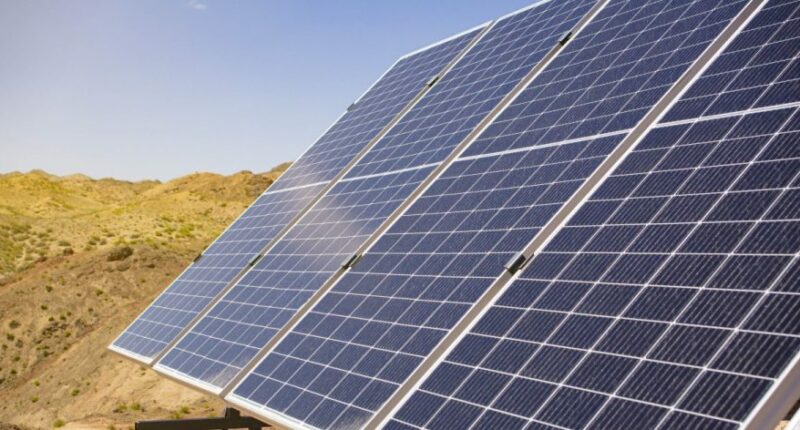Share this @internewscast.com

(NerdWallet) – President Donald Trump’s signing of the “big, beautiful bill” on July 4 was met with applause from Republicans, promoting it as a move to “drive down energy costs.” However, homeowners looking to install solar panels faced a rapid deadline to avail themselves of substantial tax credits.
The nearly 900-page bill not only reduced federal funding but also removed the solar tax credit available to homeowners installing solar panels on their residences.
Here’s what you need to know about the changes to the solar tax credit and how it’ll likely affect everyone — including those without solar panels.
What is the solar tax credit?
The solar tax credit, or residential clean energy credit, serves to decrease homeowners’ taxes when they install eligible solar equipment. This credit effectively allows homeowners to redirect money they would have otherwise paid in taxes towards the installation of solar energy systems. Taxpayers can claim up to 30% of the costs related to installing new clean energy systems on their properties.
The incentive often makes the upfront costs of switching to renewable energy more affordable for homeowners, and it has saved Americans a lot of money. In fact, more than 1.2 million taxpayers claimed $6.3 billion with the residential energy tax credit during the 2023 tax year, according to the U.S. Treasury Department. Rooftop solar electricity systems represented 60% of those claims.
What’s changed for the solar tax credit?
The current version of the solar tax credit was introduced as part of former President Joe Biden’s Inflation Reduction Act of 2022, which continued a tax break for homeowners who installed solar panels through 2034. The IRS planned to phase out the credit starting in 2033 rather than end it abruptly.
However, Trump’s bill ends the solar tax credit on December 31, 2025 — cutting off nine years of potential savings for consumers who were considering certain renewable energy systems. The end-of-year deadline also drastically reduces the time people have to schedule qualifying installations.
Homeowners who want to claim the solar tax credit for the 2025 tax year need to make a financial transaction before the new December 31 deadline, says Hector Castaneda, a certified professional accountant and president of Castaneda CPA and Associates. That means either paying with cash or financing the purchase ahead of the deadline.
What this means for consumers
Ending the solar tax credit can have far-reaching ramifications for consumers — even those who never planned to switch to solar panels.
More expensive solar installations
The average installation costs for solar panels was $27,720 in early 2025, according to EnergySage, an online solar marketplace. The federal solar tax credit saved homeowners an average of $8,316, dropping the price to $19,404.
But anyone purchasing solar panels for their homes after 2025 will have to rely only on state-based incentives to save money. States vary in what incentives they offer, saving some residents money upfront with sales tax exemptions, or money over time with property tax exemptions. But even combined with local tax credits and rebates for solar installations, state incentives won’t make up for the thousands of dollars in savings homeowners will lose after 2025.
To complicate matters, solar panel costs were already becoming volatile before Trump rang the solar tax credit’s death knell. Tariffs on imported solar components and equipment began affecting the industry earlier this year, creating uncertainty about supply chain reliability and affordability.
Cal Morton, owner of EasTex Solar, a solar installer serving the East Texas region, says the tariffs kicked off a turbulent market for solar companies. “It was already the craziest year that I can think of,” Morton says.
Consumers quickly began to feel the effects of an unstable market. The average cost of residential solar energy systems increased 3% between the first quarters of 2024 and 2025, according to a June 2025 Wood Mackenzie report. Prices are likely to continue to rise, making the solar market more unsteady without the solar tax credit.
Longer payback periods for new systems
Homeowners who purchase solar panels without the benefits of the solar tax credit will likely pay a higher price tag. This translates to a longer gap between solar installation and breaking even with a system’s savings, also known as the payback period.
The average payback period for solar customers was just over seven years in early 2025, according to EnergySage. But homeowners in some areas were already looking at closer to 20 years before breaking even on their purchases. Price hikes and the loss of the tax credit will likely lengthen those payback periods.
Lease, PPA and battery trends
As homeowners back away from solar panel purchases, companies that offer leases and power purchase agreements (PPAs) are likely to become the major competitors, says Chris Hopper, co-founder and chief executive officer of Aurora Solar, a software platform that streamlines the solar array design process for installers.
Homeowners might be able to still save money after 2025 by leasing solar panels or entering a PPA before July 4, 2026, when solar companies’ tax credits change. These arrangements allow homeowners to generate solar energy without purchasing the equipment, while the companies that own the equipment receive a tax break. If a company passes on that tax break to the consumer, it can lower the overall cost of the system.
Additionally, the deadline changes don’t apply to solar battery purchases. Homeowners who purchase batteries to use as storage systems, such as pairing with a new or existing solar energy system, can claim a tax credit to offset up to 50% of the cost. The credit will begin to phase out in 2034 and end on December 31, 2035.
Less solar power and higher electricity bills
The elimination of the solar tax credit comes at the same time that the U.S. energy market is experiencing a growing demand for power, Hopper says. Solar energy has been helping with that demand. It was responsible for 69% of the new electricity-generating capacity that utility companies added to the U.S. power grid in the first quarter of 2025, according to the Wood Mackenzie report from June 2025.
Although commercial solar projects can continue to see tax benefits longer than residential systems, they tend to take longer to put into operation. The lengthy timeline means less solar energy production to support the growing need for more energy in the meantime.
Energy Innovation, a non-partisan think tank specializing in energy, climate research and policy analysis, estimates that the loss of that additional energy will raise the cost of electricity for consumers.
Janice DiPietro, chief integration and customer officer at ReVision Energy, a New England-based solar company, agrees. She cites the combination of new tariffs, the loss of the solar tax credit and the increased demand for power as primary factors.
“As a result, electricity rates will increase at a faster than average pace,” DiPietro said by email.

















